- Home
- L. M. Montgomery
A Name for Herself Page 15
A Name for Herself Read online
Page 15
Don’t destroy other people’s illusions – this is the moral of the foregoing. I am as fond of morals as the “Duchess” in Wonderland!130 They will never forgive you for it probably. It will make them unhappy, and it doesn’t do you any good. Just because you are so unfortunate as to have lost all your own illusions don’t, out of mean malice and envy, try to rob other people of theirs. There is no need. The world will do it soon enough for them. An illusion is a brittle thing. The least little rude touch and – w-r-r-r – it is gone forever, into dust and fragments. Handle other people’s illusions very tenderly, or – better still – leave them alone. And if you have a few of your own left yet cherish and guard them jealously. When you have lost them all you will become a cynic and a nuisance. If ever the time comes when everybody has become too wise and logical to have illusions “may the present scribe be dead.”131
What a power Christmas has, to be sure! How the heart thrills to it and all it stands for – sweet old memories, the knitting closer of cords that may have strained slack through time or absence, and the realization of our common brotherhood. There is nothing in all the world so beautiful as the spirit of Christmastide. Friendly messages and gifts wing their way over many lands and seas, joyous family reunions take place in sacred old homesteads, and for one day at least the sad old world rejoices and dreams that it is young again.
Just suppose, if Christmas were to be blotted out of the calendar! Would the most daring iconoclast in the world think of trying to do it?
Are you going home for Christmas? That is the question everybody is asking everybody else. I hope you are. Christmas anywhere else than home has a sour flavor like an unripe orange.132
At our house we are resting on our oars133 – what time we are not wrapping up and addressing Christmas presents. Our work is done. Everybody is remembered that we haven’t forgotten, and we have tried to have as few misfits as possible. Theodosia undertook to pilot Ted through the mazes of his Christmas shopping. I did it last year in the integrity of my heart and the innocency of my hands. I’m wiser this year. When Ted asked me to go I said I had a very pressing engagement, and wouldn’t he ask Theodosia. Theodosia likes to be obliging and, besides, she didn’t know, so she went off gaily enough, poor thing.
That evening, after Polly and I had fanned her, and given her hot drinks, and rubbed her head with menthol134 Theodosia recovered sufficiently to sit up and give us a detailed account, partly pantomimic, of her experiences Christmas shopping with Ted. She said I ought to have warned her. But I didn’t see the necessity. It’s such fun, after you’ve fallen into a trap yourself, to watch the next person being neatly nipped in it.
Speaking of traps. Ted came home the other evening from a call, and told us this story.
“I was down to see the T’s this evening, and some other fellows were in, and the girls got us to run an obstacle race. We all went out to the hall, and a lot of things were strewn down its length – baskets and footstools and things like that. Then we blindfolded one of the chaps and started him to walk down the hall. The point was to avoid touching any of the ‘obstacles.’ He did pretty well, and then came my turn. I thought the girl who was tying up my eyes took rather long over it, but she got it done at last, and I started. I went down the hall slowly and deliberately, lifting my feet as high as I could at every step, and putting them down as carefully as if I were treading on eggshells. I didn’t touch a thing, and thought I was getting on splendidly and I couldn’t imagine why all the rest were shouting with laughter. But when I got to the end, and took the bandage from my eyes, I understood. All the ‘obstacles’ had been removed, and I had walked painstakingly down an empty hall.”
To each and all Cynthia wishes the merriest of merry Christmases, peace, joy and good-will, and gifts galore.
[Retrospection and Resolutions]
Monday, 30 December 1901
WELL, CHRISTMAS IS OVER. POLLY AND THEODOSIA and I have just begun to recover from the effects. I am afraid that deep down in our hearts we are glad that it will be a whole year before another Christmas. But do you think that we would admit it? No, indeed. Perish the thought! We had a splendid time, of course! And now that we have partially recovered from the day-after-Christmas indigestion, and have counted up the spoil we are ready to go on our way rejoicing.135 To be sure, our nerves are still in a bad condition. Theodosia is sleepy, Polly is snappy and I am stupid. Ted says – but there! Men can never understand these things!
I hope you all hung up your stockings and got them full. We didn’t have a white Christmas after all, but that wasn’t my fault. I prophesied one and that was all I could do.
Did you get any calendars given you? I got seven, Polly got six and Theodosia didn’t even get one. So are things unevenly divided up on this planet.
It is about time now that we were thinking about our New Year resolutions, isn’t it? You always make some of course. I do. Who doesn’t? But do you keep them? Ah! As Kipling says, “that’s another story.”136 Besides, there would be no fun in making New Year resolutions if one couldn’t break them.
Folks work off their Christmas indigestion making vows of reformation for the New Year. Your conscience always troubles you when your stomach isn’t in good working order. If we never overate at this season of the year we would never feel that we wanted to make resolutions. Then, when we have recovered our normal health, we break them all as cheerfully as possible.
The making of many resolutions is a sign of extreme youth. As our years increase our resolutions decrease. Time was when I made a solemn business of it. I wrote all my resolutions elaborately down on a sheet of foolscap, with the date and a verse of Scripture at the top. They used to fill one sheet and sometimes overflow on another.
“Now,” I used to say, gravely, “I will tack this document up on the wall over my writing desk. When I break a resolution I will mark a cross against it. It will be my one great aim during the coming year to have as few crosses as possible on this paper.”
Well, about the middle of February I would take that list of resolutions and sneak down to the kitchen fire with it. There would be so many crosses on it by that time that you couldn’t see the resolutions.
Nowadays, I don’t write my resolutions out. I still make a few from force of habit, of course, but I keep mum about them, so that nobody knows when they are broken. This year I am just going to make one, and I am also going to make what somebody has called a “Herculaneum” effort to keep it.137
Ted heard Polly and me discussing our New Year resolutions the other night, and he said if we were so anxious to keep them why not fine ourselves five cents every time we broke one. Polly said it would be bad enough to break your resolutions without breaking yourself, too. I demanded tragically, if he thought resolutions were made to be kept?
Ted never makes any himself. He says that whenever he makes a resolution he is immediately possessed with a wild, frenzied desire to rush out and break it. Consequently, he says, New Year resolutions are a menace to the well-being of the State.
But if you want to make some don’t let the foregoing remarks discourage you. Probably they are more the outcome of my post-Christmas cynicism than of my real belief. Even if you do break them in the long run the effort to keep them is worth something. Here’s luck to you in the keeping of yours.
In old-fashioned debating clubs and rural “literary societies” a favorite subject about this season used to be, “The year that has just passed.” The local orators thrashed it out exhaustively, and drew all the morals possible from it.
The end of the year is, as a general thing, somewhat given over to retrospection. We like to overhaul our memories as well as our consciences, on New Year’s eve, as we sit before a dying fire – it must always be dying to be properly romantic – watching the Old Year out. We grow dreamy and sad and a wee bit sentimental. We recall the loves and hatreds, the pleasures and sorrows, the successes and failures of the past twelve months. We think of our flirtations, and wonder where the Tom
s, Dicks and Harrys138 are now, and if they have forgotten. We sigh softly, and quote scraps of poetry that occur to us as appropriate. In short, we get out Memory’s treasure-box and rummage among its motley contents. We have the vague regret that everyone experiences at the turning of a life page. Good or bad, earnest or frivolous, it is written and filed away in the archives of Eternity. We will never have a chance to correct its mistakes. Old Father Time has no proof-readers.139
Then the clock strikes twelve and we open the door to let the Old Year go limping out and the New Year come joyously in. “The King is dead. Long live the King!”140
Here are some adjustable New Year resolutions:
During the coming year:
I will not lose my temper, but only mislay it occasionally.
I will never repeat gossip save to a trustworthy person.
I will try to improve other people’s minds.
I will not get into debt if I can help it.
I will not tell any fibs except in the way of business.
I will be kind and amiable when I feel like it.
I will early to bed and early to rise at least once a week.
I will try to bear other people’s misfortunes with equanimity.
I will be cheerful and smiley when everything is going right.
I will accomplish a great deal if nothing interferes to prevent me.
I will go to church regularly on fine Sundays.
I will not tell anybody that she has a cold.
I will never use slang except under great provocation.
I will not growl at the weather when it is fine.
I will never say anything to my friends’ faces that I would not say behind their backs.
I will not make puns except when the temptation is irresistible.
A happy New Year to you all is Cynthia’s wish for her readers.
[Mistakes and Blunders]
Monday, 6 January 1902
ONE MUST SAY SOMETHING ABOUT THE WEATHER, IF only from a sense of duty. Like the poor, we have it always with us, and it is a blessing, for without it what would we find to help along a conversation that had struck a snag? A sapient remark about the weather will bridge over many of “those awful silences.”141 Without it we would be lost, not having revolutions to help us out. In Chile and Venezuela, I have heard, they never talk about the weather. Instead of saying, as we do, “Isn’t it a lovely day?” or “Do you think it is going to rain?” they say, “What are the prospects for a revolution today?” or “Wasn’t that a fine revolution we had yesterday?”
But really, just now it isn’t safe to commit yourself to an opinion about the weather. It reminds me of nothing so much as the alligator in the old rhyme who “wouldn’t go along and wouldn’t stand still, but just kept bobbing up and down.”142
The other night we were talking about psychology, and Theodosia told us a bicycle story in her own inimitable way. You may not all at once see the connection between psychology and bicycles, but Theodosia evidently did.
“It is queer,” she remarked, dreamily, “what thoughts will flash into a person’s mind at times. For instance, now, the time that bicycle ran away with me last summer. What bicycle? Oh, I forgot! I never told you – I was afraid you’d laugh at me.
“Well, it was while I was out at Bridgetown in September, and a lot of us went on a bicycle picnic over North Mountain.143 I hadn’t my own wheel, so I had to borrow one, and the only one to be had was an old thing that a summer boarder had left at the M——s. I didn’t like the look of it a bit – somehow it made me think of those horses who are always putting their ears back, don’t you know? But beggars can’t be choosers,144 so I started off with it, and for a while it did very well.
“Finally, Charley and I got separated from the rest – somehow – and we were wheeling down a slight incline, when I made the horrible discovery that my wheel was running away with me. There was no doubt about it. I kept going faster and faster, and the harder I backpedalled the faster I went. Charley was left behind in no time. I lost my nerve, and the next thing I lost was the pedals. I had to hold my feet up then, and I held them up until I really thought they’d drop off at the ankles. At last I had to let them down, expecting they’d be dragged clean off. But the wheel was so high they didn’t touch the ground, and still I kept on in my mad career.
“Presently I saw a simply awful hill right before me. It looked as steep as the side of a house. I knew for a certainty that I would be killed if I kept on. I also knew that I would be killed if I jumped. But I thought to be killed at the top of the hill would be more convenient for my friends than half way down, because they would not have so far to carry me. So I shut my eyes, bid farewell to life and jumped.
“I landed under a clump of young spruce trees. I opened my eyes. I knew when I jumped that I was going to be killed, and so my first clear and distinct thought was ‘I am dead!’ I quite believed it at the time, but after a few minutes I came to the conclusion that I really could not be dead after all, because I found myself wondering if I had spoiled my hat in my fall, and that would be absurd if one were dead. But, of course, something must have happened, and my next brilliant thought was, ‘No, I am not dead, but I am unconscious.’145 I kept still for a while, and then it dawned upon me that there was really nothing the matter with me. So I crawled up in a rather dusty condition, and assured Charley, who had just arrived on the scene, that I wasn’t a bit hurt.
“Charley found that fiendish wheel half way down the hill, but nothing in the world would have induced me to mount it again. So I walked home and pushed it along. But what I want you psychologists to tell me is this. What made me think those queer thoughts when I fell?”
None of us could tell her, but we discussed the matter as wisely as if we knew all about it. Ted discovered the moral this time. It is, that you shouldn’t ride on a borrowed bicycle.
Did any of you ever write “friendship letters”? If you haven’t never do. Those of you who have will know why I give this advice. “Friendship letters” are worse than ghosts!
Perhaps some of you don’t know what friendship letters are. Well, this is how they are built. You and some friend decide to write each other a letter, to be read at some future date – five, eight or ten years from the date of writing. The letters are written and sealed up; the name and date of opening are written on the envelope; they are exchanged and kept inviolate until the time comes when they are to be opened and read – that is, if your curiosity doesn’t compel you to open them the day after you get them.
When Polly and I were at school the poetical girl of our class had an inspiration, as she thought. At a class symposium we were holding in her room – aided by chocolate caramels and other unlawful eatables – she proposed that the whole eight of us should exchange “friendship letters” – to be read a certain number of years – Polly has forbidden me to tell how many – from that night.
We thought it such a fine romantic idea then, and we put it into effect straightway. Ever since, seven letters have been reposing in a box at the bottom of my rubbish trunk. The other night the anniversary came around. Polly and I remembered our letters just in time, hunted them out and read them.
It was really a horrible experience. There was nothing romantic about it. Those letters seemed like ghostly visitations from the past. They emphasized all the little changes that had come about since they were written. Some of the writers were married; others were far away, busy women of the working world. Some we had quarrelled with and didn’t love any more. Yet here in these mocking letters they were vowing undying affection. One girl was dead, and her letters gave us the uncanny feeling of a missive from the spirit world146 – a voice calling to us across the grave – calling jokes and frivolity, too, which increased the uncanniness. Altogether we felt blue and disgruntled when we finished with those letters, jolly as most of them were, and we vowed we would never write any more.
“They’ve made me feel as if I were about a hundred years old and haunted b
y spectres of a mis-spent past,” said Polly, plaintively.
Some people accuse Theodosia of being strong-minded, but she isn’t. As a proof of my statement here is a way she has invented, all out of her own sleek brown head, to perfume her gown. When nearly ready to go out she hangs her gown upon a chair back and then, taking her chafing dish,147 she heats water to the boiling point and pours in a few drops of lavender. When the whole is simmering she sets it on the floor, minus the chafing dish, putting the flame out first, and shakes her dress over the fumes until the whole garment is infused with a delicious elusive hint of perfume. Then Theodosia puts it on and thus, arrayed in sweetness, goes forth conquering and to conquer.148
“Yes, he made a big mistake,” said Polly with a sigh.
“I don’t call it a mistake,” said Ted majestically. “I call it a blunder.”
“Well, isn’t that the same thing?” asked Polly.
“No, there is a difference,” said Ted. “For instance, suppose a fellow went to call on a friend, put an old umbrella on the stand and took away a new one when he left, that would be a mistake; but suppose he put down a new one and took away an old one, that would be a blunder, d’ye see?”
Polly admitted that Ted had scored a point.
[Unlikeable People]
Monday, 13 January 1902
EVERYBODY SEEMS TO HAVE COLDS JUST AT PRESENT. I have one. I know that I have – not so much on account of the discomfort it causes me, although that is bad enough, as because every single person I have met since I caught it – or since it caught me – has informed me that I have a cold!
It’s terribly aggravating. My informants’ intentions are good, so I cannot retaliate by some bitingly sarcastic speech which might hurt their feelings, even when it relieved mine. Besides, I can never think of my sarcasms in time. When I do think of them I say them then and there under my breath, and it is a relief, but it does not prevent the next person I meet from cheerfully saying, “Why, you’ve got a cold,” in a tone which implies that they have just made an astonishing new discovery.

 Mistress Pat
Mistress Pat A Tangled Web
A Tangled Web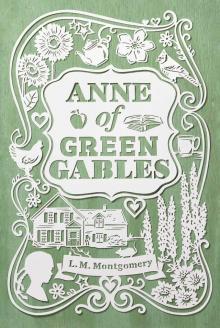 Anne of Green Gables
Anne of Green Gables Further Chronicles of Avonlea
Further Chronicles of Avonlea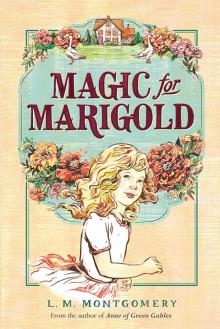 Magic for Marigold
Magic for Marigold Pat of Silver Bush
Pat of Silver Bush Anne of Avonlea
Anne of Avonlea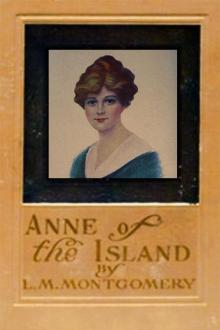 Anne of the Island
Anne of the Island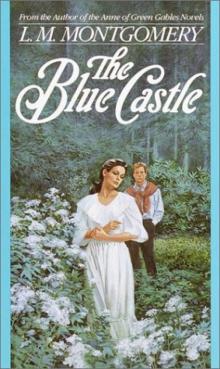 The Blue Castle
The Blue Castle The Blythes Are Quoted
The Blythes Are Quoted Emily of New Moon
Emily of New Moon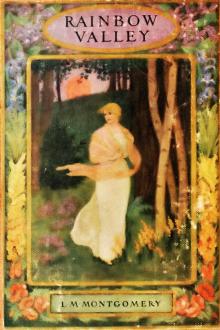 Rainbow Valley
Rainbow Valley Rilla of Ingleside
Rilla of Ingleside 07 - Rainbow Valley
07 - Rainbow Valley Anne of Green Gables (Penguin)
Anne of Green Gables (Penguin) Emily Climbs
Emily Climbs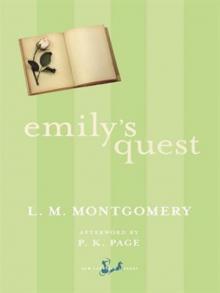 Emily's Quest
Emily's Quest A Name for Herself
A Name for Herself Anne of Windy Poplars
Anne of Windy Poplars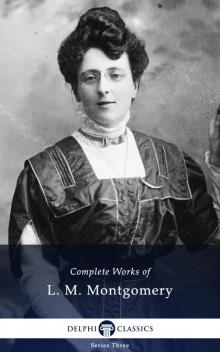 The Complete Works of L M Montgomery
The Complete Works of L M Montgomery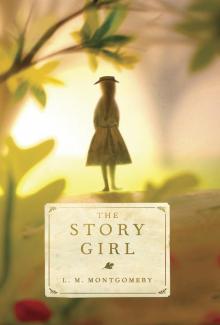 The Story Girl
The Story Girl Anne's House of Dreams
Anne's House of Dreams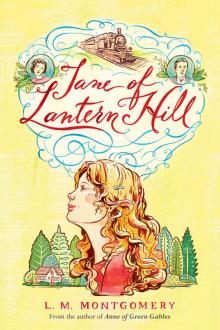 Jane of Lantern Hill
Jane of Lantern Hill Anne of Ingleside
Anne of Ingleside